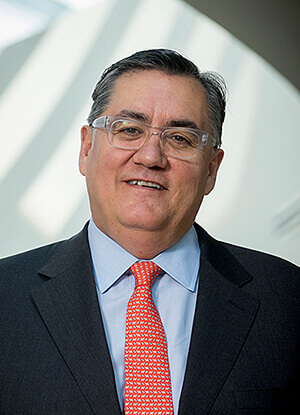May 11, 2018
White House artificial intelligence summit includes Purdue expert
 Tomás Díaz de la Rubia (Purdue University photo)
Tomás Díaz de la Rubia (Purdue University photo)
Download image
WEST LAFAYETTE, Ind. — A White House summit Thursday (May 10) on the future of artificial intelligence brought together senior government officials, corporate executives and university experts, including Purdue University's Tomás Díaz de la Rubia, chief scientist and executive director of Purdue's Discovery Park.
The summit, "Artificial Intelligence for American Industry," was held by the White House Office of Science and Technology Policy, and was hosted by White House deputy assistant for technology policy Michael Kratsios.
The summit included representatives from 38 companies, including such familiar names as Microsoft, Ford, United Airlines, Intel, Facebook, Google and Amazon.
AI experts from seven other universities also attended the meeting: the California Institute of Technology; Carnegie Mellon University; Georgia Institute of Technology; Massachusetts Institute of Technology; Stanford University; the University of California, Berkeley; and the University of Michigan.
"It was an honor to represent Purdue at this important meeting. We discussed how we can best position the United States to lead the world in research and implementation of artificial intelligence," Díaz de la Rubia said. "I want to thank the White House Office of Science and Technology Policy for convening this event."
Díaz de la Rubia said the one-day White House summit was a perfect fit with the current strategic initiatives underway at Purdue, especially Purdue's recently announced Integrative Data Science Initiative.
"Through our internal strategy and investments, we're ensuring that Purdue will be a preferred destination for American industry to develop and implement future advances in this technology," he said. "And Purdue students will be ready to enter the workforce with a deep understanding of the many ways AI is transforming American business."
The purpose of the meeting, according to a White House statement, was to accelerate progress and the use of AI in applications such as robotics, medical diagnostics and data analysis. Artificial intelligence is often heralded as the next disruptive technology. AI is already the brains behind familiar parts of our daily lives such as Siri on iPhones, facial recognition on Facebook and Amazon Alexa.
But the effects over the next two decades is expected to be massive—the global management consulting firm Accenture predicts in its report, Accenture Technology Vision 2017, that AI has the potential to double annual economic growth by 2035.
"Participation in forums such as this one at the White House is testament to the fact that Purdue is at the intellectual center of research on AI, data tools, and next-generation computing," Díaz de la Rubia said.
Purdue is aggresively increasing the number of research projects in AI, algorithms and data science to boost the implementation of these new technologies in areas such as drug discovery, autonomous vehicles and manufacturing, he said.
"We're seeing exponential advances in data science in general, and Purdue's Integrative Data Science Initiative puts us at the forefront of this rapidly moving field."
About Purdue University
Purdue University, a top public research institution, offers higher education at its highest proven value. Committed to affordability, the university has frozen tuition and most fees at 2012-2013 levels. Committed to student success, Purdue is changing the student experience with greater focus on faculty-student interaction and creative use of technology. Committed to pursuing scientific discoveries and engineered solutions, Purdue has streamlined pathways for faculty and student innovators who have a vision for moving the world forward.
Discovery Park
Discovery Park is a place where Purdue researchers move beyond traditional boundaries, collaborating across disciplines and with policymakers and business leaders to create solutions for a better world. Grand challenges of global health, global conflict and security, and those that lie at the nexus of sustainable energy, world food supply, water and the environment are the focus of researchers in Discovery Park. The translation of discovery to impact is integrated into the fabric of Discovery Park through entrepreneurship programs and partnerships.
About OSTP
In 1976, Congress established the White House Office of Science and Technology Policy (OSTP) to provide the President and others within the Executive Office of the President with advice on the scientific, engineering, and technological aspects of the economy, national security, homeland security, health, foreign relations, the environment, and the technological recovery and use of resources, among other topics.
OSTP also leads interagency science and technology policy coordination efforts, assists the Office of Management and Budget with an annual review and analysis of federal research and development in budgets, and serves as a source of scientific and technological analysis and judgment for the president with respect to major policies, plans, and programs of the federal government.
Writer: Steve Tally, 765-494-9809, steve@purdue.edu, @sciencewriter
Source: Tomás Díaz de la Rubia, 765-496-6625, tddlr@purdue.edu
Related Web site:
"Trump administration vows to maintain U.S. edge in AI technology," The Wall Street Journal

